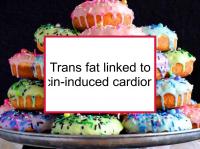Hydrogenation stabilizes oils and fats, preventing them from becoming rancid and keeping them solid at room temperature, thereby increasing product shelf life and reducing refrigeration requirements. Partial hydrogenation results in the formation of trans-fatty acids (trans fats), which are found in many commercially prepared foods.
Most trans fats are produced during industrial hydrogenation, but trans fats are also naturally present in butterfat and meat from ruminants such as cattle, sheep and goats. High intake of the trans fats has been associated with modestly increased breast cancer risk and reduced survival. Now a new study has reported that intake of trans fats during doxorubicin chemotherapy could increase the potentially toxic effects of this treatment on the heart.
doxorubicin-induced cardiomyopathy
Doxorubicin chemotherapy can cause cardiomyopathy, damage to the heart muscle that weakens its ability to pump and can lead to heart failure. Symptoms of such heart damage can become apparent during chemotherapy, shortly after treatment, or years later. Cardiomyopathy can resolve quickly or be so severe as to cause death. Rates of chemotherapy-induced cardiomyopathy have variously been estimated at 2% to 15%. Although women with pre-existing cardiovascular disease are more vulnerable to the effects of cardiomyopathy, all breast cancer patients treated with doxorubicin should consider themselves potentially vulnerable to this side effect.
While doxorubicin is the best known breast cancer treatment that induces cardiomyopathy, other drugs such as epirubicin, 5-FU, and platinum-based chemotherapy drugs such as cisplatin, as well as trastuzumab (Herceptin), can also cause heart damage.
The foods below have been found to protect against doxorubicin-induced cardiomyopathy in laboratory animals without interfering with the anti-cancer effects of the treatment:
Previous studies have reported that alcohol and fish oil supplements can potentially increase the harmful impact of doxorubicin on the heart.
Latest research finds trans fat exacerbates heart damage
The study referenced at the beginning of this news article was designed to investigate the combined effects of dietary trans fat and doxorubicin on oxidative, inflammatory, and coagulatory cardiac stress in a mouse model of cardiomyopathy. Mice on a trans fat-enriched diet were found to develop increased trans fatty acid deposit in the heart, as well as reduced protein C and antithrombin-III activities in circulation.
The trans fat diet plus doxorubicin treatment resulted in heightened activities of plasminogen activator inhibitor-1, lactate dehydrogenase, and creatine phosphokinase, in addition to raising xanthine oxidase activity. The combination of diet and treatment also increased cardiac levels of reactive oxygen species, interleukin (IL)-6, IL-10, tumor necrosis factor-alpha, and monocyte chemoattractant protein-1 more than the trans fat diet or doxorubicin treatment alone.
The trans fat diet alone increased cardiac nuclear factor kappa B (NF-kB) activity, but did not influence expression of NF-kB and mitogen-activated protein kinase (MAPK). While doxorubicin treatment alone augmented cardiac activity, mRNA expression, and protein production of NF-kB and MAPK, the trans fat diet plus doxorubicin treatment further upregulated cardiac expression of NF-kB p65, p-p38, and p-ERK1/2.
The authors conclude that the findings suggest that a high trans fat diet exacerbates doxorubicin-induced cardiotoxicity.
Please see our articles on breast cancer diet during doxorubicin chemotherapy and factors influencing doxorubicin effectiveness for more information on how to optimize treatment and reduce side effects.
